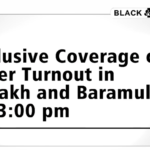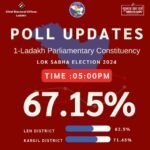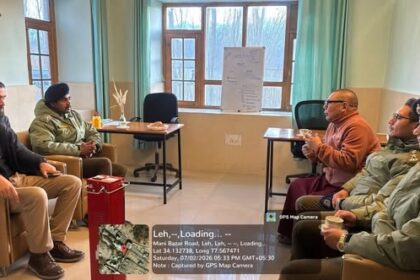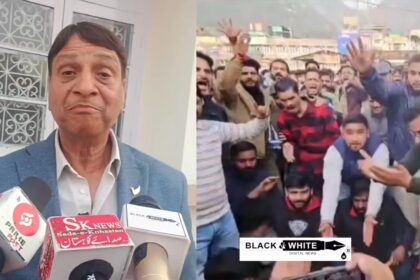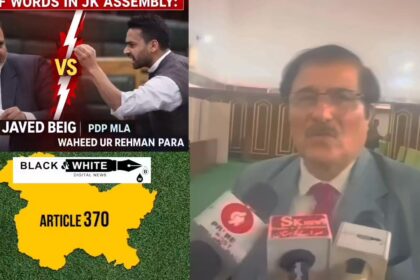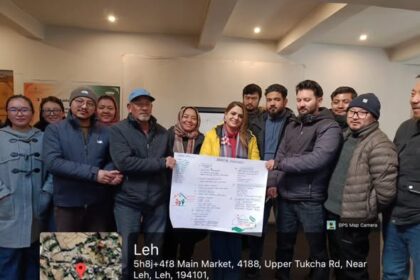Political Whirlwind in Baramulla: Sajad Lone’s Dramatic Turn Against the Abdullahs.
I won’t regret losing but Omar Abdullah must not win…*Sajad Lone*
||Black and White Digital News||
||Parvinder Singh May 20, 2024||
Baramulla, a key district in the Kashmir Valley, is at the heart of a political storm as voters head to the polls in unprecedented numbers. At the center of this storm is Sajad Gani Lone, a figure whose political journey from separatism to mainstream politics mirrors the turbulence of the region itself. With a history marked by tragedy, controversy, and transformation, Lone’s current campaign is both compelling and confusing to the electorate.
**Sajad Lone’s Complex Political Journey**
Born on December 9, 1966, Sajad Lone is the younger son of Abdul Gani Lone, a prominent Hurriyat leader assassinated in 2002. This tragic event was a turning point for Sajad, propelling him into the political spotlight. Despite initial affiliations with separatist politics, accusations from hardline separatist Syed Ali Shah Geelani in 2002—claiming Lone fielded proxy candidates—led to a significant split within the Hurriyat Conference. By 2004, Lone had parted ways with his brother Bilal to establish his own faction of the People’s Conference.
The 2008 Assembly elections, held in the wake of the deadly Amarnath land row agitation, saw a high voter turnout that influenced Lone’s perspective. Encouraging separatists to reconsider their approach, he took the electoral plunge in 2009 as an independent candidate from Baramulla, though he lost to National Conference candidate Sharifuddin Shariq. His marriage to Amanullah Khan’s daughter and subsequent political engagements solidified his commitment to mainstream politics.
**Altaf Bukhari’s Support and Strategic Alliances**
In the current Lok Sabha elections, Lone has found an unexpected ally in Altaf Bukhari, leader of the Apni Party. Bukhari’s support for Lone is seen as a strategic move, raising questions about the motivations and future implications of this alliance. This partnership signifies a reshaping of political allegiances in the Valley, as Bukhari and Lone work together to challenge the established political order.
**BJP’s Strategic Silence**
The BJP’s decision not to field a candidate in Kashmir this election cycle has further fueled speculation and confusion. This strategic silence could be interpreted as a calculated move to consolidate support through proxies or to avoid exacerbating tensions in the volatile region. The absence of a BJP candidate leaves the field open for candidates like Lone, backed by Bukhari’s Apni Party, to make significant inroads.
**Voter Confusion and Neglected Issues**
As political rallies swell with crowds, voters are left in a state of confusion and disillusionment. Key issues such as development, employment, healthcare, education, and infrastructure are glaringly absent from the political discourse. Instead, the campaign has been dominated by personal vendettas and shifting alliances, leaving the electorate to navigate through a fog of ambiguity and frustration.
**Historical Context and Personal Struggles**
Lone’s political journey is deeply intertwined with personal and historical struggles. His father’s assassination in 2002, his own detention following the abrogation of Article 370, and subsequent allegations of mistreatment have all shaped his political persona. Detained at the Centaur hotel-turned-makeshift jail, Lone’s experiences have only added to the complexities of his political narrative. His release in 2020 marked another chapter in his storied career, filled with both physical and psychological trials.
**Current Electoral Scene and Political Rhetoric**
The Baramulla Lok Sabha elections are seeing an extraordinary voter turnout, reflecting a highly charged political atmosphere. Key candidates like Sajad Lone, Omar Abdullah, and Engineer Rashid are drawing massive crowds to their rallies. Notably, Lone, once a spokesperson for the People’s Alliance for Gupkar Declaration (PAGD), has turned against his former allies, particularly Omar Abdullah. Lone’s criticism of Abdullah and his insistence that voters prevent Abdullah’s victory—even at the cost of his own loss—highlight the deep political fissures and strategic maneuvering in play.
**Conclusion: The Uncertain Future of Baramulla**
As the people of Baramulla cast their votes, the region stands at a crossroads. The political landscape, dominated by Sajad Lone’s multifaceted persona and his strategic alliances, reflects the broader uncertainties and challenges facing Kashmir. With key issues left unaddressed and the electorate caught in a web of political drama, the outcome of these elections will have significant ramifications for the future trajectory of the Valley’s politics and governance.
The electorate, grappling with a mix of hope and skepticism, watches closely as Baramulla’s political narrative unfolds. In a region where historical grievances meet contemporary political challenges, voters yearn for clarity and concrete plans that address their fundamental needs and aspirations. As the dust settles on this high-stakes election, the true impact of Sajad Lone’s gamble will become clear, shaping the future of Baramulla and the broader Kashmir Valley.
Leave a comment
You Might Also Like
SSP Leh Along with District Officials Visit De-Addiction Centre Leh, Encourage Patients Towards Recovery and Rehabilitation
SSP Leh Along with District Officials Visit De-Addiction Centre Leh, Encourage Patients Towards Recovery and Rehabilitation Leh, Feb 9: Today,…
1 Min Read
Katra Roop Way Bun Kar Rehega MLA Katra Baldev Raj Sharma Ka Bayan Me Jeeta He Isi Promise Pe Hu
Katra Roop Way Bun Kar Rehega MLA Katra Baldev Raj Sharma Ka Bayan Me Jeeta He Isi Promise Pe Hu…
0 Min Read
PDP Na BJP K Sath Alliance Na Kiya Hota Aaj Article 370 Bhi Hota Aur J&K Ki Halat Bhi Behtar Hoti Nc Senior Leader Mubarak Gul
PDP Na BJP K Sath Alliance Na Kiya Hota Aaj Article 370 Bhi Hota Aur J&K Ki Halat Bhi Behtar…
0 Min Read
Implementation of Rural Development Schemes Concludes at Leh
Implementation of Rural Development Schemes Concludes at Leh Leh, February 07, 2026: The three-day State-Level Training Programme on Effective Implementation…
2 Min Read


